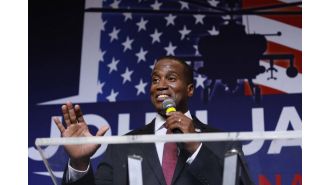Lori Chavez-DeRemer, chosen by Trump for labor secretary, important information to be aware of.
Trump picks Rep. Lori Chavez-DeRemer of Oregon to head Department of Labor.

On Friday, President-elect Donald Trump announced that he has chosen Oregon Representative Lori Chavez-DeRemer to lead the Department of Labor in his second administration. Despite losing her reelection bid in November, Chavez-DeRemer has strong support from unions in her district. Her confirmation will need to be approved by the Senate, which will be under Republican control when Trump takes office on January 20, 2025.
For those who may not be familiar with her, here are some things to know about the labor secretary-designate and what her role could mean for Trump's encore presidency. Chavez-DeRemer has a pro-labor record that has garnered support from unions, which may come as a surprise given the Republican Party's typical alliances with business interests. She has shown her support for workers' rights and organized labor, even going as far as backing the PRO Act, a bill that would make it easier for workers to unionize on a federal level.
In addition to this, Chavez-DeRemer co-sponsored legislation that would protect public-sector workers from having their Social Security benefits docked because of government pension benefits. However, both of these proposals have faced challenges due to lack of support from GOP members.
Despite Chavez-DeRemer's pro-labor record, some union leaders remain skeptical of Trump's agenda. While the president-elect has portrayed himself as a friend of the working class, his past actions have caused hesitation among labor leaders. Trump has appointed business-friendly individuals to the National Labor Relations Board and has generally supported policies that would make it harder for workers to unionize. He has even criticized union leaders and suggested that members of the United Auto Workers should not pay their dues. In addition, his administration has not been in favor of expanding overtime eligibility rules.
After Trump's announcement on Friday, both the National Education Association and the AFL-CIO praised Chavez-DeRemer's record but also expressed concerns about what her role as labor secretary could mean for workers and students. The Department of Labor is expected to play a larger role in the spotlight in Trump's second term, especially with the emphasis he has placed on the working class. This could also bring attention to the department's historically uncontroversial role in maintaining labor statistics, which has been a target of criticism from Trump in the past.
If confirmed, Chavez-DeRemer may find herself in the middle of conflicts between the nonpartisan Bureau of Labor Statistics and a president who has strong opinions about government statistics and their role in reflecting the state of the economy. She may also face scrutiny in her handling of overtime rules and could be involved in Trump's controversial immigration policies, which could potentially pit the administration against economic sectors and companies that heavily rely on immigrant labor.
Not only would Chavez-DeRemer bring her pro-labor stance to the Cabinet room, but she would also add diversity as the first Republican woman elected to Congress from Oregon. She joins Senator Marco Rubio as the second Latino pick for Trump's second Cabinet, following in the footsteps of former labor secretary, Alexander Acosta. With her confirmation, Chavez-DeRemer would have the opportunity to make a significant impact on labor issues and shape the direction of the Department of Labor under Trump's presidency.
13 Views










